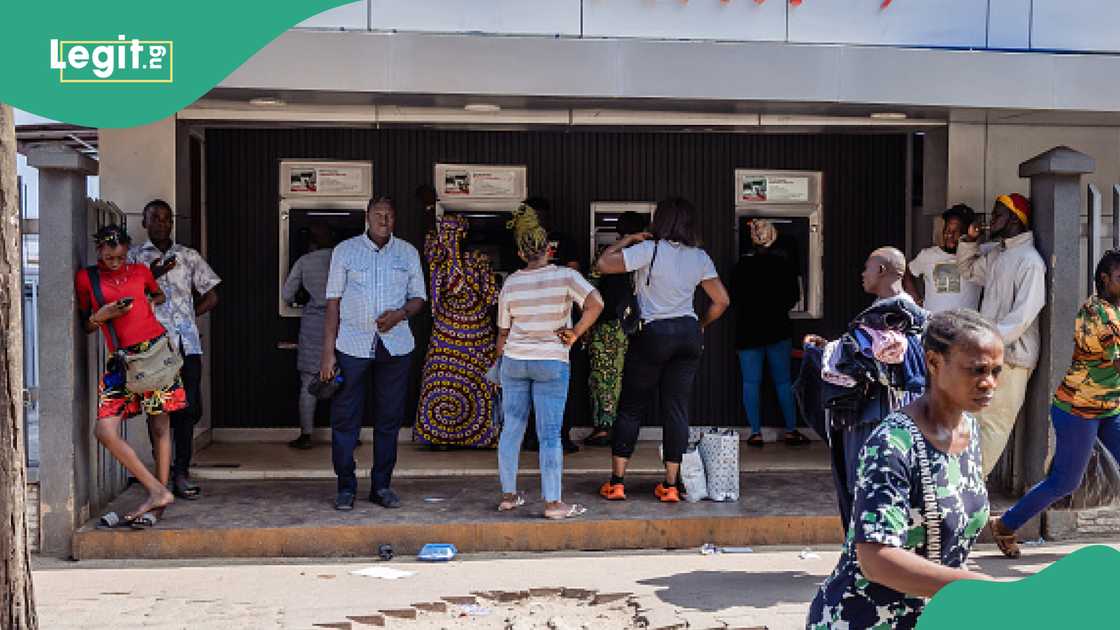Analysts Speak as Nigerians Shun Banks, Seek Alternative Means of Keeping Money
- The amount of currency held outside Nigeria’s banking system surged to N3.79tn in June 2024
- A sizable amount of money outside of the traditional banking industry undermines the CBN's policy objectives
- According to CBN data, loans to the private sector fell from N74.3 trillion to N73.12 trillion recently
Legit.ng journalist Zainab Iwayemi has over 3-year-experience covering the Economy, Technology, and Capital Market.
Experts said that the enormous amount of unbanked money has been seriously impeding the Central Bank of Nigeria's (CBN) ability to effectively implement its policies and manage the country's economy.

Source: Getty Images
According to recent data available, the amount of currency held outside of Nigeria's banking system increased to N3.79tn in June 2024 from N3.61tn in April.
The Chief Economist at Zenith Bank, Marcel Okeke, emphasized the importance of this issue, stressing that the significant volume of money outside the conventional banking sector hampers the CBN’s policy aims.
PAY ATTENTION: Legit.ng Needs Your Help! Take our Survey Now and See Improvements at LEGIT.NG Tomorrow
According to him, the CBN's power to affect economic activity is weakened and its control over important financial measures, such the Cash Reserve Ratio, is restricted by the substantial volume of unbanked cash.
“The CBN may struggle to effectively implement its policies to manage excess liquidity due to the significant presence of the informal sector,” Okeke added.
CBN addresses financial inclusion
The punch reported that the CBN has been addressing this problem by increasing financial inclusion through initiatives that educate and promote banking in rural areas.
But Okeke emphasised that many Nigerians remain ignorant of even the most basic financial concepts, as these efforts have only touched a small portion of the country's population.
He advised,
“To improve financial literacy and bring more money into the banking system, the CBN and deposit money banks must continue campaigns and provide incentives for digital banking.”
Mary Ogundokun, a chartered accountant and former banker, also voiced worries about the growing amount of cash outside the banking system and issued a warning about possible inflation of the cash pool.
“Banks primarily generate income through loans and deposits. Loan interest rates are a significant source of income,” Ogundokun explained.
“However, if there’s insufficient cash in the bank’s vault, they cannot loan as much, reducing their income.”
This reduction in lending capacity can have far-reaching effects on the economy. Ogundokun said,
“This affects the economy, as people’s purchasing power increases with more cash in circulation, potentially leading to cash pool inflation.”
“Considering the implications of banking activities on the economy, we must act now to prevent potential economic instability.”
Fathiat Olamide also explained how the situation is causing harm to her. She told Legit.ng,
"Imagine having to pay money to buy your own money because the so called banks are oit of cash. This is uncalled for."
Situation affecting banking activities
CBN data showed that there has been a decrease in credit to the private sector, from N74.3tn to N73.12tn, indicating reduced lending activities by banks. This decline is likely due to liquidity constraints and the need for banks to prioritise their recapitalisation efforts.
The data also revealed an increase in the money supply to N101.35tn, up from N99.24tn, and a rise in narrow money, which includes physical currency and demand deposits, to N36.78tn from N33.38tn.
An economist at Lotus Beta Analytics, Shadrach Israel, noted that while these figures suggest growing liquidity in the economy, the concentration of funds outside the banking system limits banks’ access to these resources.
On a positive note, the CBN’s net foreign assets have increased to N18.33tn, signalling strength in the country’s external reserves. However, net domestic assets have slightly decreased to N83.0tn from N83.90tn.
PoS Operators Slash Charges
Legit.ng reported that the Central Bank of Nigeria has revealed that currency outside the banks surged to an all-time high of N3.28 trillion as of June 2024.
This represents 93% of the total N4.04 trillion currency in circulation, indicating that banks have just over N1 trillion available to attend to customers.
The CBN disclosed the figures in its money statistics data published on its website and obtained by Legit.ng.
PAY ATTENTION: Сheck out news that is picked exactly for YOU ➡️ find the “Recommended for you” block on the home page and enjoy!
Source: Legit.ng






